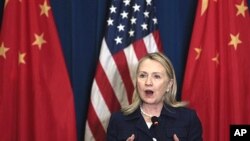“The United States remains committed to building a cooperative partnership based on mutual benefit and mutual respect,” U.S. Secretary of State Hillary Rodham Clinton said at the opening session of the fourth annual U.S.-China Strategic and Economic Dialogue in Beijing. “In today’s world, no global player can afford to treat geopolitics as a zero-sum game, so we are working to build a relationship that allows both of our countries to flourish without unhealthy competition or conflict, while at the same time meeting our responsibilities to our people and to the international community.”
The United States and China have already become thoroughly and inescapably interdependent, and therefore, a thriving China is good for America, and a thriving America is good for China. “If China’s rising capabilities means that we have an increasingly able and engaged partner in solving the threats we face to both regional and global security - that is all good,” Secretary Clinton said.
But building a cooperative, resilient, mutually beneficial relationship is not easy. That’s why constructive dialogues between the United States and China are critical as well as necessary. “We are discussing how the talks are opening economic activity to advance prosperity, support innovation, and improve the lives of people, how to promote greater military transparency to avoid misunderstandings, to build trust and maintain mutual stability, and how to tackle some of the world’s most urgent crises from climate change to proliferation,” she said.
“As part of our dialogue, the United States raises the importance of human rights and fundamental freedoms because we believe that all governments do have to answer to citizens’ aspirations for dignity and the rule of law, and that no nation can or should deny those rights,” Secretary Clinton continued. “A China that protects the rights of all its citizens will be a stronger and more prosperous nation, and of course, a stronger partner on behalf of our common goals.”
The continuing conversations between Washington and Beijing reflect how much the U.S.-China relationship has grown since President Nixon came to China in 1972.
“It’s fair to say China and the United States cannot solve all the problems of the world,” Secretary Clinton said in conclusion. “But without our cooperation, it is doubtful any problem can be solved. And so . . . we go forward with our dialogue, seeking opportunities for engagement, building ties that are not only between governments but family, friends, entrepreneurs, students, scholars, artists, and so much else.”
U.S.and China Strategic And Economic Dialogue

We are working to build a relationship that allows both of our countries to flourish.



